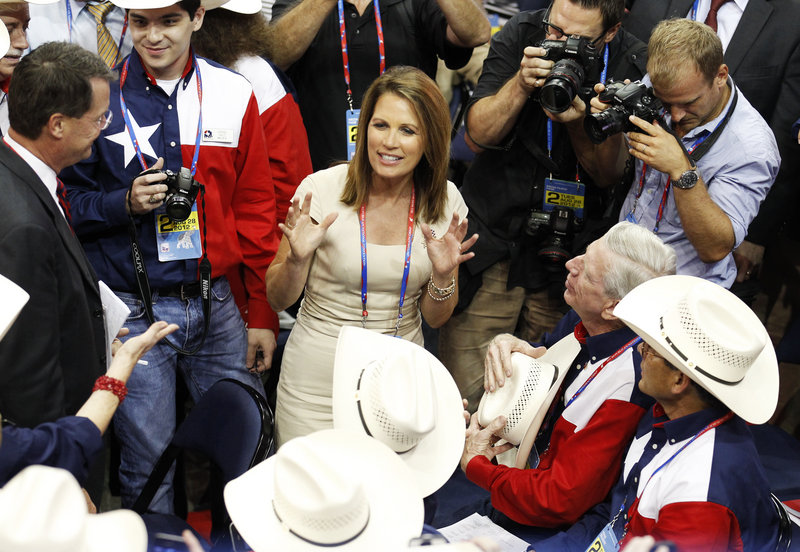On a hot July afternoon in 2010, in the shadow of the U.S. Capitol, Rep. Michele Bachmann, R-Minn., launched the House Tea Party Caucus with much fanfare and a little humility, declaring, “I am not the head of the tea party.”
It was a signature moment for the tea party and for Bachmann, who had parlayed her standing as one of the most identifiable faces of that anti-government movement to become one of the most recognizable political figures in American politics. And the new House caucus suggested that the movement’s fervor was about to bear legislative fruit.
Less than three years later, everything seems to have changed. Just before dawn Wednesday, Bachmann, 57 — barely re-elected in November and facing multiple investigations of her failed presidential campaign’s finances — announced that she will not seek re-election to her suburban Twin Cities district in 2014.
Bachmann joins the ranks of other once high-profile tea party voices who have moved to the political sidelines:
• Sarah Palin resigned as Alaska governor in 2009 and has focused on reality TV of late.
• Joe Walsh, R-Ill., and Allen West, R-Fla., two of the most outspoken members of the 2010 class of House freshmen, lost their 2012 re-election bids and are working in media careers.
The biggest stars now reside in the Senate, where two first-termers, Rand Paul, R-Ky., and Ted Cruz, R-Tex., have electrified the movement in recent months and established themselves as the leading disruptive forces to Democratic Majority Leader Harry Reid’s bid to move President Obama’s second-term agenda. Still, they are in no position to implement or advance their conservative philosophy legislatively.
To many, Bachmann’s roughly five-year run was a near-perfect reflection of the tea party’s greatest strengths and weaknesses.
In her career in elected office, she has been able to command attention and draw fans among conservative activists, tapping into online messaging that allowed her to raise nearly $30 million for her past two House races.
But under the Capitol dome, where collegial relations are the foundation of building coalitions to pass laws, Bachmann had little clout, a largely aloof figure with no legislative imprint even now in her seventh year in Congress. Her statements often put fellow Republicans on the defensive.
“Bachmann had great potential but didn’t have the discipline, detachment or ear for prime time,” said Ed Rogers, a longtime Republican lobbyist and strategist.
Bachmann’s meteoric rise and fall came to symbolize many aspects of Congress in the 21st century. It is the age of the provocateur, where conservatives on the far right and liberals on the far left who would have been puckish figures in a previous era instead become national sensations for the several million political junkies who follow cable news and devour online politics.
First elected in 2006, Bachmann quickly became a regular on political cable TV shows.
In October 2008, appearing on MSNBC’s “Hardball With Chris Matthews,” she questioned whether then-Sen. Barack Obama, D-Ill., held “very anti-American views.” The moment brought condemnation from critics and sent independent voters in her district into the arms of an otherwise unknown challenger.
But it also brought her millions of dollars in small donations from conservatives nationwide. She narrowly won re-election and became the first congressional tea party star.
House Speaker John Boehner, R-Ohio, and Majority Leader Eric Cantor, R-Va., kept their distance from Bachmann, supporting a different candidate when she considered running for a junior leadership post after the 2010 midterm elections.
But in a sign of tea party clout outside Washington, Bachmann’s presidential bid initially soared to the top of opinion polls alongside veteran Republicans. “I think that I just had a real sense of the pulse of the people,” she said in early 2011.
Bachmann’s political career peaked in August 2011 when she won the Ames Straw Poll in Iowa, a perceived test of organizational ability ahead of the state’s 2012 presidential caucuses.
On the day Bachmann won the straw vote, Texas Gov. Rick Perry formally entered the Republican presidential primary race, sapping enthusiasm for her candidacy.
Bachmann withdrew from the campaign after a disappointing sixth-place finish in the Iowa caucuses in January 2012.
Back on Capitol Hill, she never regained the cachet that she had wielded in the previous two years. With her impact focused heavily on media attention, particularly on conservative-friendly Fox News Channel or with radio hosts such as Laura Ingraham, Bachmann’s legislative career did not add up to much.
Her initiatives — including a bid to repeal the Dodd-Frank banking overhaul and another to rein in the Obama administration’s effort to regulate light bulbs — rarely made it out of subcommittee, and the Tea Party Caucus’ influence has waned.
She barely survived her 2012 re-election bid, and early this year both FBI and congressional ethics investigators began interviewing former campaign workers amid allegations of improper expenditures.
Even political talk shows had lost interest: Five months into 2013, Bachmann has not appeared on any of the Sunday programs, compared to 27 appearances in the previous two years.
In announcing her retirement, she hinted that she might make a political comeback someday.
“There is no future option or opportunity, be it directly in the political arena or otherwise, that I won’t be giving serious consideration, if it can help save and protect our great nation for future generations,” she said.
Send questions/comments to the editors.



Success. Please wait for the page to reload. If the page does not reload within 5 seconds, please refresh the page.
Enter your email and password to access comments.
Hi, to comment on stories you must . This profile is in addition to your subscription and website login.
Already have a commenting profile? .
Invalid username/password.
Please check your email to confirm and complete your registration.
Only subscribers are eligible to post comments. Please subscribe or login first for digital access. Here’s why.
Use the form below to reset your password. When you've submitted your account email, we will send an email with a reset code.